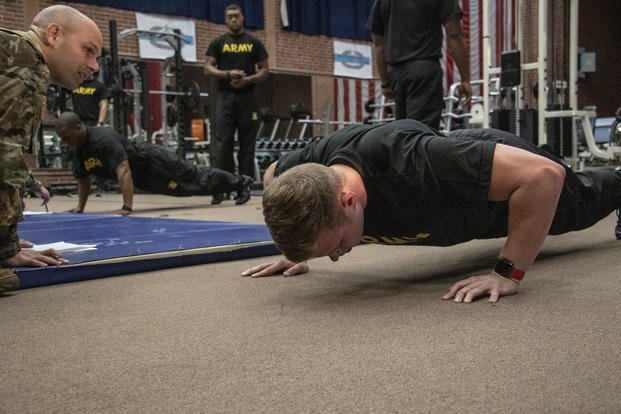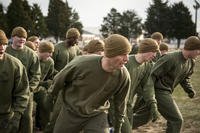Many people who like to do calisthenics find the goal of doing 100 push-ups a fun challenge to attempt. Many are also working to build up to that number and get stuck at 75 for a considerable time during their journey to be competitive on special operations, entry-level fitness tests.
The following is a workout adjustment I recommend when you have tried daily push-up regimens and are still stuck at 75 for months at a time:
A recent spec-ops candidate shared two fitness test scores over two months' time, showing improvement from 75 push-ups in two minutes to 110. Here are the changes we made to his program that pushed him off that plateau.
1. We Did Fewer Push-ups
Yes, when you do daily push-ups and accumulate 200-300 a day, that volume is shocking to the body. It can often produce big gains for short periods (7-10 days, max), but when done for months, most people see negative gains or elbow or shoulder tendinitis.
Instead, we did push-ups every other day, along with other events on the test (pull-ups, sit-ups, run and swim). Now instead of doing 1,500-2,000 push-ups a week, the total volume dropped by more than 50% to the 600-800 range. This is plenty, as the thing to remember is that you improve by recovering from the reps -- not just doing them day after day.
At this volume, you need to treat your recovery periods between the same exercises as you do when lifting weights.
2. Do the Pyramid, Super Set, Max-Rep Set Week
I call this the Classic PT Week that allows for you to work on all of the events equally and receive the proper amounts of recovery your body is not used to getting (if you do daily push-ups/pull-ups, etc.). The Classic PT Week places these workouts throughout the week with ample space for recovery and growth and helps you maintain the other elements of the test.
3. Add Bench Presses + Push-ups
Face it. If you can get 75 push-ups, that is pretty good. Improving by a large percentage is not easy in a two-minute test when you are at this level, as you are strong enough to do push-ups and have a decent amount of muscle stamina. Most people lack the muscle stamina to last the final minute in this event.
Instead of doing multiple sets of two-minute push-up tests, try the following bench-press/push-up combo:
Repeat five times.
- Bench press 10 reps
- Push-ups max (no rest)
- Rest as needed before the next set
Pick a heavy weight on the bench press that you can barely do 10 times. Do not pick a weight that you can do 12 times. For instance, if you have to add a few more bench-press reps until you get one rep from failing, do it.
Then drop off the bench and go immediately into the push-ups. See how many you can get. This number should be barely in the double digits as most people fail at 5-9 reps. The goal is to help you simulate the last 30 seconds of the two-minute push-up test.
As you start to fail in push-ups, this will feel exactly how it is when you are at that 1:45 mark in the two-minute test. Pushing through this sticking point will help you improve your overall performance in the second half of the push-up test instead of burning out and stopping.
You will find the bench press + push-up combo will be the most challenging of the three options. My advice is to start off with push-ups every other day in the classic PT week for a month. If you do not see much movement, add the bench press + push-up combo in place of the Super Set Day in the middle of the week.
These changes should take you off the plateau and into improved levels of performance on the push-up test.
Stew Smith is a former Navy SEAL and fitness author certified as a Strength and Conditioning Specialist (CSCS) with the National Strength and Conditioning Association. Visit his Fitness eBook store if you're looking to start a workout program to create a healthy lifestyle. Send your fitness questions to stew@stewsmith.com.
Want to Learn More About Military Life?
Whether you're thinking of joining the military, looking for fitness and basic training tips, or keeping up with military life and benefits, Military.com has you covered. Subscribe to Military.com to have military news, updates and resources delivered directly to your inbox.


















